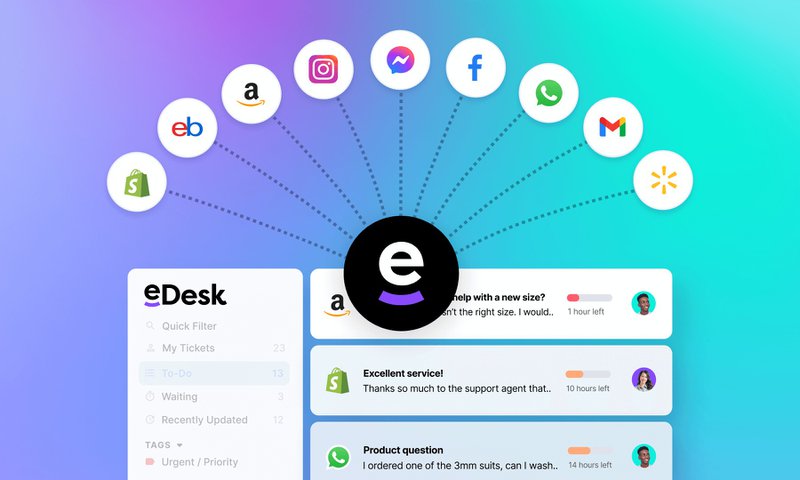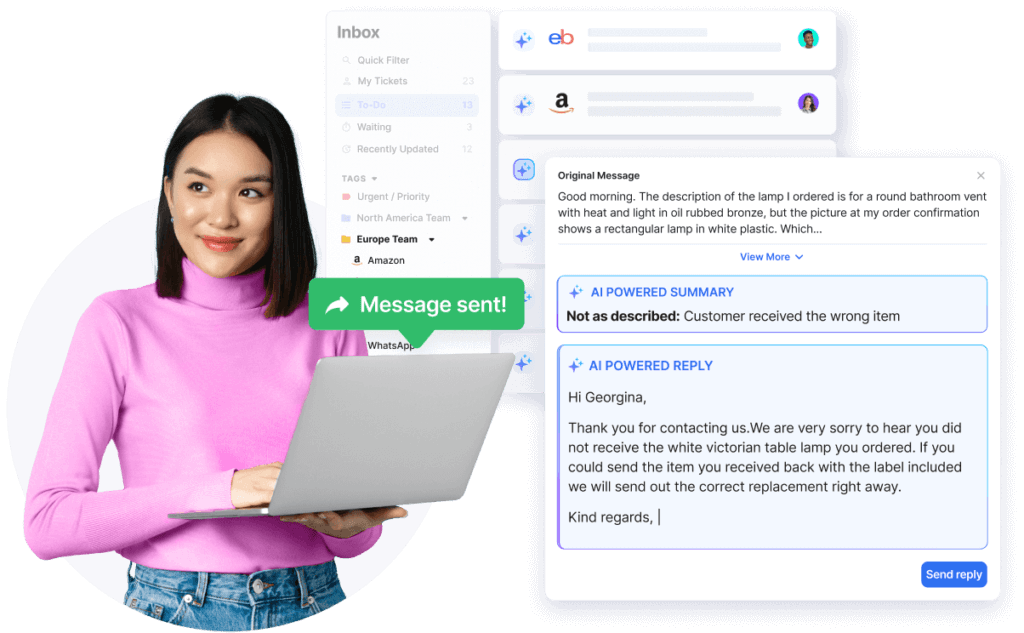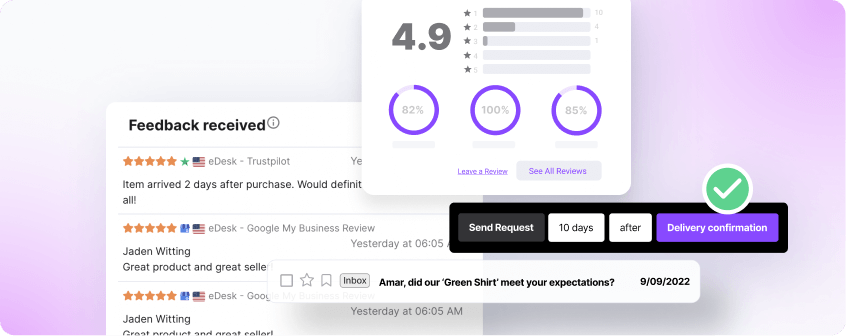Customer support matters …in all customer-facing businesses, whether you’re digital-first or operate from brick-and-mortar sites. Customers want to be heard, they want answers, and they want help – all of which they want quickly. And when we say quickly, in eCommerce, we mean right here, right now (or as close as you can get to it) – no matter the time of day or night, whether you’re asleep, have the flu or are celebrating your birthday.
Because eCommerce doesn’t sleep (or get the flu, or celebrate its birthday, for that matter) and the most successful online retailers not only know that, but use it to gain a competitive edge. And you can do exactly the same thing.
Step forward AI customer support.
Forward-thinking businesses striving for efficiency and competitive advantage are increasingly using AI in customer support as their secret sauce. Because, simply put, your customer service experience can make or break a sale – and even impact brand loyalty.
To help you make the most of it, we’ll delve into the world of AI-powered customer support in eCommerce, and take a look behind the curtain at its concepts, applications, and easy-to-implement strategies …which are all aimed at enhancing your customer engagement, maximizing resources, and boosting your bottom line.
What we’re going to talk about
- The AI Revolution: Implementing AI for customer support is crucial for enhancing business efficiency, reducing costs, and improving customer relationships.
- Sentiment Analysis: Use AI customer support tools with sentiment and classification capabilities to optimally manage customer inquiries, reducing workload and improving response times.
- Smart Inbox: AI-powered centralization of all customer messages enables timely and efficient customer service management.
- Automated Responses: AI-powered customer support systems provide intelligent email responses that save time and improve service quality.
- Conversational AI Chatbots: Advanced virtual assistants offer 24/7 support and can learn from past interactions for personalized service.
- Review Collection & Analysis: AI streamlines feedback collection and analysis to continually refine your automation strategy.
- Human-AI Collaboration: Despite the advantages of automation, maintaining authentic human interactions supported by AI is essential for complex issues.
What is AI Customer Support Automation in eCommerce?

In eCommerce – where everything moves and evolves in the blink of an eye – customer service holds a position of massive importance. As the front line of brand reputation, it plays a pivotal role in fostering consumer trust and loyalty. But what transformative benefits does AI in customer support bring to this critical domain?
AI customer support automation is a powerful framework that harnesses generative AI, machine learning, and natural language processing with efficient software solutions to revolutionize how businesses interact with customers.
Its goal? To provide quick, consistent, and increasingly personalized answers to customer inquiries without constant human intervention. But it’s so much more than that – AI for customer support offers multiple advantages, including reducing manual labor, providing round-the-clock support, and meeting the expectations of today’s global consumer (who shops at all times of the day …and night). All of which means embracing AI-powered customer support technology has become crucial for anyone aiming to deliver superior eCommerce customer experiences.
The Evolution of AI in Customer Support
The journey of AI in customer support has seen a remarkable evolution over the past decade (or so). Early applications were limited to simple rule-based systems that could only handle the most basic customer queries, but oh, how times have changed. Today’s AI customer support solutions utilize sophisticated machine learning algorithms and natural language processing to understand customer questions with remarkable accuracy.
This evolution has been driven by several factors:
- Advancements in NLP: Modern AI systems can understand context, sentiment, and even cultural nuances in customer communications.
- Data Availability: The explosion of customer interaction data has provided rich training sets for AI models.
- Computing Power: Cloud infrastructure has made it possible to deploy powerful AI models cost-effectively.
- Customer Expectations: Today’s consumers expect immediate, 24/7 service across multiple channels.
For eCommerce businesses, this evolution means implementing AI for customer support is no longer optional but (as we mentioned, but it bears repeating) a competitive necessity. Companies that effectively leverage AI-powered customer support can significantly enhance customer satisfaction while reducing operational costs. Sound good? Of course it does. So how can it help you? Read on, dear reader…
How is AI used in customer support?
Now let’s explore the various ways in which AI customer support presents itself in modern customer service operations:
Intelligent Automated Emails
Advanced AI for customer support systems triggers personalized emails based on specific customer actions like past purchases or abandoned carts. Unlike simple automated emails, AI-powered systems analyze customer data and shopping patterns to craft messages that resonate with individual preferences and behaviors, keeping customers engaged without manual involvement (and happily so).
AI-Enhanced Help Desks & Ticketing Systems
AI in customer support identifies issues from customers’ messages using natural language processing to understand customer questions and directs them into appropriate queues based on their urgency, complexity, or nature. These systems continuously learn from resolutions to improve their classification accuracy over time.
Conversational AI Chatbots
As perhaps one of the most visible applications of AI-powered customer support, advanced chatbots answer complex queries accurately using conversational AI and natural language processing. Modern AI chatbots can maintain context throughout conversations, understand customer intent, and even detect emotional states to provide appropriate responses.
Dynamic Knowledge Bases & FAQs
AI-powered self-service options rely on machine learning and natural language processing to instantly provide answers from an extensive database. These systems continuously improve by analyzing search patterns and query success rates, ensuring customers find relevant information quickly.
Intelligent Social Media Monitoring
AI customer support tools keep tabs on sentiment analysis and maintain your brand image through automatic screening that not only filters out irrelevant content but also identifies potential service issues before they escalate. These tools can prioritize responses based on customer influence and the potential business impact of each interaction.
5 Powerful Ways To Implement AI Customer Support in eCommerce
When stepping up digital transformation (or even getting started with it) many businesses are looking for sophisticated ways to implement AI in customer support for their eCommerce operations. And why not? After all, this will give you increased efficiency and more time to focus on high-value tasks that demand human intervention. So, with that in mind, let’s take a closer look at the top five ways of implementing AI customer support:
1. AI-Powered Ticket Sentiment & Classification

Firstly, ticket sentiment and classification seem like simple administrative tasks, but automating them with AI for customer support can transform your service operations. Advanced AI customer support software classifies customer queries based on the problem type, intent, or intended department, making sure it lands directly with the correct individual or team.
Moreover, sophisticated AI-powered customer support solutions like eDesk AI can analyze the emotion expressed by customers in their complaint – categorizing it as positive, negative, or neutral with remarkable accuracy. This capability dramatically helps determine which issues should be prioritized and addressed first and assists support agents in preemptively understanding the emotional state of customers.
AI agent productivity significantly increases when they’re armed with this insight. Support teams can craft, in collaboration with suggestions from AI tools, suitable responses and adjust their tone to meet the customer’s emotional needs. This enhances the overall customer experience and builds stronger customer relationships by showing empathy and understanding from the first interaction.
2. AI-Enhanced Smart Inbox

A smart inbox powered by AI customer support technology is the next leap toward outstanding customer support automation. It assimilates all incoming communications from various channels – emails, live chats, social media – and consolidates them into a single platform for ease of access and response.
The power of this AI tool doesn’t end there; intelligent inboxes use specific algorithms and machine learning to highlight and surface urgent or high-priority messages requiring immediate attention over general ones. The system understands customer data contextually, rapidly improving response times while preventing crucial tickets from falling through the cracks.
The results speak for themselves. eDesk customer q-parts demonstrated how using an AI-enhanced smart inbox to automatically group, prioritize and assign customer queries helped them achieve their 24-hour response time SLA and increase ticket management to 50 tickets per person per day – a clear example of how AI in customer support directly improves agent productivity and customer satisfaction (just in case you needed further proof).
3. AI-Generated Hands-Free Responses

Next up is making AI-generated hands-free responses a central part of your AI customer support strategy. If your team finds themselves often replying with similar answers to common inquiries, having AI-crafted responses or templates speeds things up considerably, all while maintaining that all-important quality and consistency.
Defined in the industry as “macros” (or as ‘templates’ by eDesk), these automatic replies excellently address standard questions about product details or shipping information. Unlike their robotic predecessors, modern AI-powered customer support systems create responses that are personalized and context-specific using dynamic content fields such as customer name, order ID, or previous purchase history for a genuine human-like feel. You’re not trying to fool anyone into thinking the AI is human – that’s not the point. The point is that they feel confident, comfortable and (let’s be honest here) not irritated by its responses.
Now, the latest advances in generative AI have taken this capability even further. AI systems can now craft completely original responses that match your brand voice while addressing the specific context of each customer inquiry. These systems learn from successful interactions and continuously improve their response quality, ensuring customers receive helpful, natural-sounding answers that don’t feel automated.
4. Conversational AI Chatbots
Conversational AI chatbots are revolutionizing AI customer support. And we know that’s a big statement …but seriously.
These sophisticated systems remain available round-the-clock for assistance, and their biggest advantage is handling multiple complex queries simultaneously – something even the best human agents find challenging.
These AI-powered customer support chatbots are programmed with detailed product and company knowledge and use natural language processing to understand customer questions with remarkable accuracy. They can interpret customer intent beyond the literal words used and provide contextually appropriate responses.
Additionally, advanced conversational AI chatbots are evolving to guide customers through purchase processes, making personalized recommendations based on preferences and purchase history, and even detecting emotional cues to adjust their communication style. This takes the eCommerce customer service game to an entirely new level of sophistication and effectiveness.
5. AI-Driven Review Collection and Analysis

Finally, collecting and analyzing reviews and feedback from your customers has been transformed by AI for customer support solutions. Advanced systems can schedule automated, personalized emails or messages seeking feedback after a successful order delivery or interaction.
What sets AI-driven review systems apart is their ability to analyze feedback at scale, identifying trends, sentiment patterns, and specific areas for improvement. This helps businesses continually enhance their strategies by having real-time performance insights derived from actual customer experiences.
A well-rounded AI review collection strategy allows you to highlight positive experiences of satisfied customers while identifying areas for improvement that might have gone unnoticed in the mass of feedback data. The AI customer support tools can even suggest specific actions based on the analysis, turning customer feedback into actionable business intelligence.
A great example of this approach in action can be seen with Right Deals UK. They harnessed the power of eDesk’s AI-enhanced feedback product and, in just 12 months, accumulated an impressive 3,022 positive feedback ratings on eBay. This remarkable achievement resulted in a stellar 97.5% positive feedback rating and earned them the prestigious status of being an eBay top-rated seller.
The Strategic Benefits of AI Customer Support for eCommerce
Implementing AI in customer support brings a whole host of strategic advantages that go way beyond simple automation. To give you a flavour of that, here’s how AI-powered customer support can transform your eCommerce business:
Cost Efficiency and Scalability
One of the most compelling benefits of AI customer support is its ability to handle increasing customer service demands without proportional increases in staffing costs. AI systems can manage routine inquiries that typically consume up to 80% of support agents’ time, allowing businesses to scale operations efficiently during peak seasons or growth periods.
A mid-sized eCommerce retailer implemented an AI customer support chatbot and reduced their customer service operational costs by 30% while simultaneously improving response times by 60%. This efficiency allows businesses to redirect resources toward strategic initiatives rather than routine support functions.
Enhanced Customer Experience
Modern consumers (by which we mean people like you and us) expect instant, accurate responses regardless of when they shop. AI for customer support enables businesses to meet these expectations by providing:
- 24/7 availability across all channels
- Consistent responses regardless of volume
- Personalized interactions based on customer history
- Proactive service before issues escalate
Research shows that 69% of consumers prefer chatbots for quick answers to simple questions, and businesses using AI-powered customer support report an average 35% increase in customer satisfaction scores.
Data-Driven Insights
Perhaps one of the most valuable yet overlooked benefits of AI customer support is the wealth of customer intelligence it generates. AI systems can:
- Identify frequently asked questions that might indicate product or website usability issues
- Recognize trending product issues before they become widespread problems
- Analyze customer sentiment across different product lines or service touchpoints
- Predict customer needs based on browsing and purchase patterns
These insights enable eCommerce businesses to move from reactive to proactive customer service and product development strategies.
Competitive Advantage
In today’s competitive eCommerce landscape, providing exceptional customer service is a key differentiator. Businesses that effectively leverage AI in customer support gain significant advantages:
- Faster response times than competitors (typically 5-10x faster for common inquiries)
- Higher customer satisfaction leading to improved retention rates
- Better resource allocation, allowing human agents to focus on high-value customer interactions
- Continuous improvement through AI learning capabilities
Challenges When Implementing AI Customer Support
While the benefits are compelling, implementing AI customer support comes with challenges that businesses should prepare for:
Integration Complexities
Many businesses struggle to integrate AI-powered customer support systems with existing CRM, inventory, and order management systems. This integration is crucial for the AI to access the data needed to provide helpful responses. Successful implementation requires a strategic approach to data architecture and API management.
Training Requirements
AI systems require significant training to understand your specific products, services, and customer issues. This typically involves:
- Creating comprehensive knowledge bases
- Developing conversation flows for common scenarios
- Training the AI on historical customer interactions
- Providing continuous feedback to improve accuracy
Managing Customer Expectations
Some customers may have negative preconceptions about AI customer support based on poor experiences with primitive systems. So setting appropriate expectations and providing easy escalation paths to human agents is essential for them to not only get along with it and accept it, but actually appreciate it and find it useful.
The Human-AI Balance
Despite advances in AI for customer support, human agents remain completely essential for complex problem-solving, empathy in difficult situations, and handling the unexpected. Finding the right balance between AI and human support requires ongoing assessment and adjustment.
The Future of AI in Customer Support
The evolution of AI customer support continues at pace, with several emerging trends that will shape its future:
Multimodal AI Support
Next-generation AI-powered customer support will go beyond text to incorporate voice, image, and video understanding. Customers will be able to show problems through their camera, speak naturally to AI agents, or receive video tutorials generated specifically for their issue.
Predictive Support
Rather than waiting for customers to report problems, AI in customer support will increasingly identify potential issues before they occur. By analyzing browsing patterns, purchase history, and product usage data, AI systems will proactively reach out to customers with solutions or recommendations.
Emotional Intelligence
While early AI customer support systems could detect basic sentiment, future systems will understand and respond appropriately to complex emotional states. This emotional intelligence will enable more natural, empathetic interactions that build customer trust and loyalty.
Autonomous Resolution
The most advanced AI for customer support will move beyond answering questions to autonomously resolving issues. This might include processing returns, applying credits, or making account adjustments without human intervention but with appropriate guardrails …the sky’s the limit, really.
Learn more about eDesk:
The Transformative Power of AI Customer Support
The concept of AI customer support in eCommerce boils down to leveraging advanced technology to refine and streamline customer interactions. This involves integrating various AI-powered tools like smart inboxes, conversational chatbots, intelligent hands-free responses, and ticket sentiment classifiers into your business operations. Such implementation not only alleviates the workload on your support team but also maintains and often enhances customer satisfaction levels.
Companies are increasingly recognizing these advantages and are adopting AI-powered customer support tools for their efficiency in handling repetitive tasks, allowing their workforce to focus on complex, value-added tasks that require human empathy and problem-solving abilities. This guide aims to provide you with actionable insights on how to implement these AI in customer support strategies effectively.
By strategically implementing AI customer support, you can boost efficiency, save time, improve consistency, and reduce human errors, transforming your customer service department and elevating the overall customer experience on your platform. The businesses that thrive in the coming years will be those that successfully balance technological efficiency with the human touch, creating support experiences that build lasting customer relationships.
As AI for customer support continues to evolve, staying informed about emerging capabilities and best practices will be essential for maintaining competitive advantage and meeting the ever-increasing expectations of eCommerce customers.
Learn more about eDesk AI Customer Support: start a free trial today.




